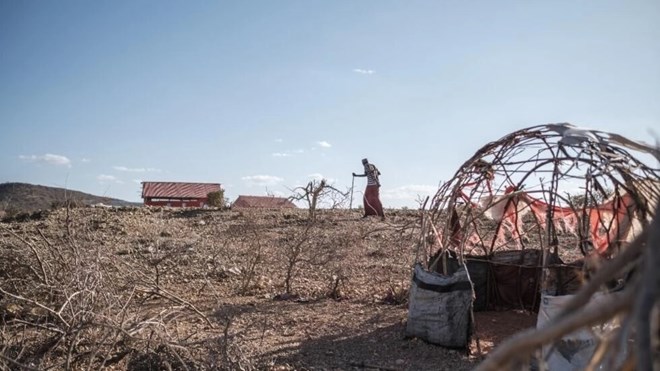
Saturday April 29, 2023

The five rainy seasons since the end of 2020 have failed, triggering the worst drought in four decades in Ethiopia, Somalia and Kenya. © AFP - Eduardo Soteras
A report released Thursday shows that the devastating series of droughts that has struck the Horn of Africa since late 2020 would not have occurred without global warming.
"Human-caused climate change has made agricultural drought in the Horn of Africa about 100 times more likely," said a summary of the report by the World Weather Attribution (WWA) group.
"The ongoing devastating drought would not have happened at all without the effect of greenhouse gas emissions," it added.
Since late 2020, countries on the Horn of Africa - Djibouti, Ethiopia, Eritrea, Kenya, Somalia, South Sudan and Sudan - have been suffering the worst drought in four decades.
The extended drought has led to the deaths of millions of cattle and wiped out crops.
The WWA study concentrated on the three areas worst hit by the drought: southern Ethiopia, Somalia and eastern Kenya.
20 million people at risk of food insecurity
While climate change had little effect on total annual rainfall in the region, "higher temperatures have significantly increased evaporation from soil and plants, which has made dry soils much more likely", according to the 19 scientists who contributed to the WWA report.
"Without this effect, the region would not have experienced agricultural drought - when crops and pastures are affected by dry conditions - over the last two years," the summary added.
"Instead, widespread crop failures and livestock deaths have left more than 20 million people at risk of acute food insecurity."
The WWA said that, for its rapid analysis, "scientists looked at changes in rainfall in 2021 and 2022 in the worst-affected region, covering southern Ethiopia, southern Somalia and eastern Kenya".
Rainfall periods impacted
"They found that climate change is affecting the rainfall periods in opposite ways. The long rains are becoming drier, with low rainfall now about twice as likely, while the short rains are becoming wetter due to climate change," it added.
"This trend in the short rains has been masked recently by the La Nina weather pattern, which reduces rainfall in the short rains."
Joyce Kimutai, a Kenyan climatologist who contributed to the report, said: "We need to innovate across and throughout food systems, improve collaboration, involve vulnerable groups, make the best use of data and information, as well as incorporating new technologies and traditional knowledge."
The WWA network, set up by leading climate scientists, has built a reputation in recent years for its capacity to evaluate the extent to which climate change has contributed to extreme weather events.